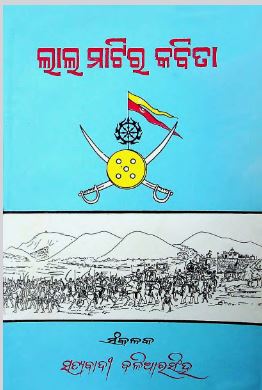Odia literature has always been a rich tapestry of deep emotions, cultural heritage, and revolutionary thoughts. Among its many gems, “Lal Matira Kabita” by Satyabadi Baliarsingh stands out as a poignant tribute to the indomitable spirit of Khordha, a land synonymous with valor and resistance. Published in 2001, this compilation of poems captivates readers with its fervent imagery and resonant themes, making it a significant work in Odia poetry.
Satyabadi Baliarsingh, a celebrated figure in Odia literary circles, is renowned for his evocative and heartfelt verses. His ability to seamlessly blend historical narratives with contemporary issues has earned him accolades from critics and readers alike. In “Lal Matira Kabita,” Baliarsingh brings his craft to the forefront, using poetry as a medium to explore and exalt the revolutionary past of Khordha.
At its core, “Lal Matira Kabita” – which translates to “Poems of the Red Earth” – is a revolutionary work. The title itself is a metaphor, symbolizing the blood-soaked battlefield of Khordha, where countless warriors laid down their lives for the cause of freedom. Baliarsingh’s poems are not mere recollections of past events; they are a clarion call for contemporary society to remember, cherish, and be inspired by the sacrifices of the past.
One cannot read this book without feeling the weight of history and the spirit of rebellion that courses through its pages. From the heroic tales of Bakshi Jagabandhu to the collective struggle of the common folk, Baliarsingh’s poetry captures the zeitgeist of a time when resistance was not just a choice but a necessity.
“Lal Matira Kabita” is not a monolithic narrative but a compilation of sub-poems, each contributing to the overarching theme of revolution. These sub-poems delve into various facets of Khordha’s heritage, intertwining personal anecdotes with broader historical events. For instance, some poems vividly depict the tumultuous battles, while others reflect on the quiet resilience of the families left behind.
The use of different poetic forms and styles within the compilation showcases Baliarsingh’s versatility and deep understanding of poetic expression. Whether it’s through lyrical ballads or stark free verse, each sub-poem adds a unique texture to the compilation, enriching the reader’s experience.
Khordha, often heralded as the last bastion of independent Odisha before British colonization, holds a place of pride in the hearts of Odias. Baliarsingh’s work not only recounts the historical significance of Khordha but also serves as an ode to its enduring spirit. The vivid descriptions of its landscape, the valor of its people, and the unbreakable bond between land and identity are palpable throughout the book.
Readers are transported to the heart of Khordha, experiencing its trials and triumphs as if they were part of the historical tableau. The poems evoke a sense of place that is both nostalgic and urgent, urging contemporary readers to draw lessons from the past and continue the legacy of resilience and resistance.
“Lal Matira Kabita” is more than just a book of poems; it is a testament to the revolutionary spirit of Khordha and the timeless power of poetry to inspire change. Satyabadi Baliarsingh’s masterful compilation reminds us of the sacrifices of our forebears and the enduring power of the written word. Published in 2001, its relevance continues undiminished, resonating with readers who seek inspiration from history and poetry.
In these tumultuous times, “Lal Matira Kabita” stands as a beacon, reminding us that the spirit of revolution is not confined to the past but is a living, breathing force that shapes our present and future.
Books Info
| Books name | Lal Matira Kabita/ଲାଲ୍ ମାଟିର କବିତା |
| Author | Baidyanatha Baral |
| No Of pages | 96 |
| Publisher | Vidyapuri |
| Publication | 2001 |
| Printed At | Arnnapurnna Printers |
| Distributor | NA |

